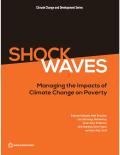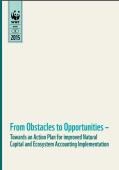This report provides a new detailed quantitative assessment of the consequences of climate change on economic growth through to 2060 and beyond. It focuses on how climate change affects different drivers of growth, including labour productivity and capital supply, in different sectors across the world. The sectoral and regional analysis shows that while the impacts of climate change spread across all sectors and all regions, the largest negative consequences are projected to be found in the health and agricultural sectors, with damages especially strong in Africa and Asia.

Climate change and climate policies will affect poverty reduction efforts through direct and immediate impacts on the poor and by affecting factors that condition poverty reduction, such as economic growth. This report explores the relation between climate change, climate policies, and poverty outcomes by examining three questions: the (static) impact on poor people's livelihood and well-being; the impact on the risk for non-poor individuals to fall into poverty; and the impact on the ability of poor people to escape poverty. The report explores various channels through which climate change and policies will affect poverty: economic impacts through incomes and prices; natural disasters and their effects on assets and livelihoods; and health impacts. It also investigates policy options to ensure adaptation and mitigation policies -- such as adaptive and well-targeted social protection, public investments, and financial inclusion policies -- contribute to poverty reduction and protect poor people against climate change impacts.

Over the last decade a consensus has been growing that accounting for natural capital and integrating that approach in governmental and business decision-making is an important pillar of global, national, regional, local and corporate conservation efforts. Accounting for natural capital aims to support halting biodiversity loss and avoiding the deterioration of ecosystems and the services they provide that underpin human well-being and economic prosperity. The Global Biodiversity Outlook (GBO-4) published in 2014 states that progress has been made in mapping and assessment of biodiversity, ecosystems and their services and in incorporation of their values into planning processes and strategies. However, there is still relatively little attention given to the integration of natural capital accounting into national reporting and accounting systems.
Adaptation presents developing countries with the ultimate dual challenge – building a rapidly evolving, sustainable economy within an environment increasingly altered by the impacts of climate change. To meet this challenge, adaptation policy must find balance and create synergy between the two, as climate resilience and economic resilience go hand in hand.
Economic development is associated with structural change, including an evolving sector composition, the emergence of new comparative advantages and skills, and shifts in consumer demand as a result of rising incomes – all of which has implications for adaptation. Existing attempts to adapt developing economies to climate change have nonetheless ignored these economic dynamics. Current approaches to adaptation often seek to preserve current structures, for example by protecting agricultural output, which neither acknowledges nor takes advantage of the fact that the status quo is evolving.
Climate change is expected to increase risks to businesses, infrastructure, assets and economies. Understanding how to involve the private sector in responding to these risks – or encouraging them to take advantage of the new business opportunities that may arise from changing climate conditions – is crucial to catalyze greater investment in activities that increase countries, businesses, and communities’ resilience.
